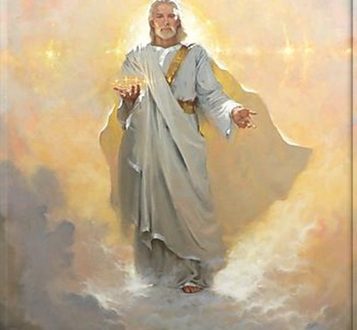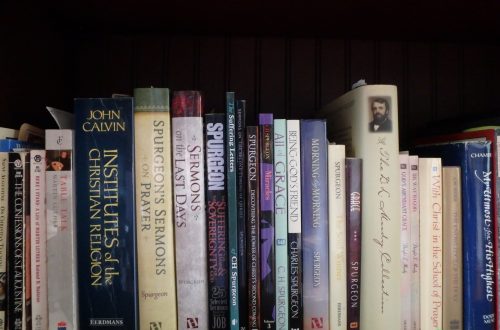God’s deep knowledge of us
Psalm 139 forms part of the lectionary readings for the second Sunday after Epiphany, which is January 17th. The heading of this ode indicates that it was originally meant to be a part of the worship liturgy performed in the temple by the leader of the Levitical choir. Moreover, the poem, which is attributed to David, was a melodious “psalm” intended to be accompanied by instrumental music.
In this wisdom song of descriptive praise, Israel’s king affirmed that God not only created him, but also was familiar with every intimate detail of his life. Believers of all ages have understood that God knows the most minor aspects about them.
Yet, deep inside, people of faith have also understood that, for their own spiritual well-being, it is important to open themselves up to God’s searching gaze. That’s just what David did.
The psalm’s original historical context seems to be a situation involving some danger. Perhaps Israel’s king exposed his life to God as a way of proving that he did not deserve divine punishment through his enemies.
Yet, before we get any hint of earthly peril, David eloquently described God’s complete awareness of him. The Hebrew verb rendered “searched” (v. 1) can also be translated “to investigate” or “to examine thoroughly.”
The poet stated that this was the basis for God’s knowledge of him. Theologians refer to this attribute of God as omniscience, a term that literally refers to “all knowledge.”
Scripture teaches that God has unlimited awareness, understanding, and insight. Put differently, His knowledge and grasp of all things is universal and complete.
The Creator’s awareness is instantaneous, exhaustive, and absolutely correct. Even though all things are eternally present in God’s view, He still recognizes them as successive, finite events in time.
The Lord is aware of every thought people have and every action they perform (2 Chron 28:9). He can objectively and fairly evaluate the actions of people, because He knows everything (2 Sam 2:3).
All wisdom and counsel reside with the Creator (Job 12:13), and His understanding has no limit (Ps 147:5). There is nothing in the entire universe that is not hidden from the Lord’s sight. Everything is exposed by His penetrating gaze (Heb 4:13).
God’s awareness of all things serves two purposes. First, everyone is accountable to the Creator for his or her actions. No one will be able to do evil and get away with it.
Second, God’s omniscience reminds us that He is intimately aware of our circumstances. He not only sees our plight, but also reaches out in love to care for us (Gen 16:13).
The Lord’s knowledge of David was not abstract, but specific and detailed. Psalm 139:2 mentions when the king sat down and stood up, which is a general reference to his daily activities as Israel’s head of state.
Even though God was in heaven, He remained completely aware of David’s thoughts and understood his motives. Moreover, the Lord carefully observed when the monarch traveled and when he lay down to rest.
God was familiar with every aspect of David’s life, whether public or private (v. 3). The Hebrew verb rendered “discern” literally refers to the winnowing of grain. Like the sharp-eyed farmer who scrutinizes the harvest and evaluates what is to be saved or thrown aside, God observes, keeps track of, and examines the human heart.
Concerning David, the Lord knew what His bondservant would say before he uttered it. The Creator did not miss a single one of the poet’s thoughts. In a manner of speaking, David’s life was like an open book to the Lord.
God knows everything about us, too. We might think that the people closest to us—a spouse, family members, and friends—know us well. Yet, no one, not even ourselves, knows us the way the Lord does. Remembering this truth should make us more careful about what we think, say, and do.
There was no doubt in David’s mind that before his mouth framed a word, the Creator was already fully aware of what the king would say (v. 4). Regardless of the dangers Israel’s monarch might face, God went before him and followed him.
Metaphorically speaking, the Lord encircled David all around. The idea is that God used His powerful arm to protect His bondservant from every side.
Furthermore, the Creator placed His hand of blessing on David (v. 5). The king admitted that God’s awareness of him was so extraordinary that it went far beyond his comprehension. In fact, what the Lord knew about David was so infinite that he was unable to fathom it (v. 6).
We know enough about our personal thoughts and actions to realize that God is not totally pleased with what He sees. To be sure, we may even wonder why the Creator is so patient with our imperfections. Yet, rather than casting us aside, the Lord constantly secures us with His merciful care.
The realization that God knows everything and still loves each person filled the poet with awe. If God knows our thoughts, some will wonder, then why pray?
Yet, prayer is not a news hotline to provide the Almighty with a breaking development taking place on earth. After all, He is fully focused on everything that is occurring and even understands the motives and implications for everyone involved.
There are benefits in praying, even though God knows the situation, along with the words we use in addressing Him. For example, prayer brings the believer into conscious fellowship with God, gives perspective on issues, and channels strength and peace into the life of the one who is praying.
At times, God uses prayer to change circumstances and make a visible difference in an issue. We are encouraged in Scripture to pray, believing that the Lord will bring His will to pass.
Admittedly, in this life, no one will be wise enough to fully explain the mysteries of prayer. Yet, God has shown us both in Scripture and in the experience of Christians past and present that believing prayer is a powerful resource.
As human beings, we are limited by the boundaries of time and space. For example, we cannot occupy two places simultaneously.
In contrast, God is not subject to such restrictions. He is omnipresent, meaning present everywhere at once.
Nor is the Creator divided, like minerals that may be scattered over a wide expanse of terrain. At all times, the Lord is totally present everywhere.
David did not arrive at the preceding truths easily. In his imagination, he pondered several ways one might try to evade God’s presence (v. 7).
First, the poet thought about ascending to heaven or sprawling out in the realm of the dead (v. 8). Together these places represented the most extreme vertical distances. It’s as if David was saying, “If I ascended as high as I could, or descended to the lowest imaginable depth, I could not escape Your reach.”
Yet, what about the horizontal extremes? Suppose the poet made the rising sun his chariot and raced to the utmost reach of the western horizon (v. 9)?
Even if David could somehow settle down on the other side of the Mediterranean Sea (which lies west of Israel), the Lord would still be there to afford support every hour of every day (v. 10). In contrast to idols, there is no point on any map where the Creator is not fully present to protect and guide His people.
David considered another possibility: hiding (vv. 11–12). Adam and Eve tried to hide from God among the trees within the ancient Eden orchard.
David thought about using the night as a screen to hide himself from God. However, the poet rejected this possibility as well, since God can see in darkness as well as in light.
David had to give up the idea of escaping from God. So must we all. And once we have recognized the futility of escape attempts, we can begin to happily accept that God is everywhere, just as we can joyfully accept that the Creator knows everything about us.
David had reached the point of spiritual maturity at which he had come to accept God’s knowledge of him. The poet realized that every day of his life, from the first to the last, was known to the Lord.
In David’s day, people knew little about how a human fetus forms in its mother’s womb. Yet, David understood that God knows about this, for He is the one who causes it to happen.
The Lord is in charge of each individual’s genetic code and brings together the substances that make up a human being. Also, since the result is obviously a remarkable creation, David considered the making of a child a sign of the Creator’s wisdom.
The process that takes place in the “mother’s womb” (v. 13; also called “the secret place,” v. 15, and “the depths of the earth”) is like the creation of a work of art. David compared the formation of a human child to the skilled weaving of cloth on a loom.
Children are “knit . . . together” (v. 13) and “woven” (v. 15) by God inside the womb. Both the mind and the heart, the intellect and emotions (as well as the will) are the handiwork of God.
David exclaimed that the Lord’s deeds are awesome. Also, just as amazing is the Creator’s thorough knowledge of every human being from the moment of their conception (v. 14). We who have seen photographs of fetuses at various stages of development should be even more amazed than David.
In verse 15, David commented on the formation of his bones in the womb of his mother, a place characterized by utter seclusion. He poetically described the gestation process for all human beings as one of being stitched together deep in the earth below.
Israel’s king declared that before we were born, God knew everything that would happen on each of our days as though all the events were written in a book (v. 16). As we consider our future, it might appear obsure to us, but it is clear to the Lord. Therefore, we can proceed confidently, knowing that whatever awaits us, the Creator remains by our side.
The Lord’s thoughts were far beyond David’s ability to number (in other words, to comprehend). Nevertheless, God’s thoughts were “precious” (v. 17) to the king, for they meant that the Lord had the ability and the willingness to care for His spiritual children.
Moreover, even though we may lose consciousness of the Creator when we are asleep, He never loses consciousness of us (v. 18). When we awaken from sleep (even the sleep of death), we will be with God and He with us. He will never leave us.
Verse 19 marks an abrupt transition. Suddenly, David began talking about wicked people who were his enemies and foes of God.
These scoundrels, said David, were “bloodthirsty.” Furthermore, they misused God’s name, probably by calling down curses on the Lord’s faithful servants. The miscreants hated God and opposed Him.
Though abrupt, the transition makes sense. The earlier part of the psalm revealed that God’s knowledge demonstrates His ability to care for His people and that it encourages them to love Him.
Verses 19–22 reveal the psalmist’s confidence that God could deal with the poet’s enemies. Those verses also reveal the king’s zeal for the Lord and for His standards of righteousness.
Though zealous for the Creator, David knew better than to think that he was perfect in God’s sight. The poet’s “troubled thoughts” (v. 23) might have been caused by the idea of God searching him. Yet, David invited the Lord to examine him anyway, probe his thoughts, and assess his concerns.
The king believed there was no grossly “offensive way” (v. 24) in him, such as the idolatry within his enemies. Admittedly, this process of God sifting through David’s life would bring up some impurities for cleansing. Also, this cleansing would open the way to greater progress in the “way everlasting” (the ancient moral path that leads to eternal life, through faith in the Messiah).
So, the psalmist asked God to test him, cleanse him, and thereby vindicate him. David’s exercise of freely opening his life to the Creator is one each Christian could profitably adopt.
Sometimes we try to keep parts of our lives hidden from the Lord. We don’t acknowledge before Him some of our most cherished sins.
Therefore, we need the courage and faith to acknowledge that God knows everything about us. We can do so, knowing that afterward will come the healing and sanctifying work of the Spirit.
Key ideas to contemplate
According to the Old Testament, God is omnipresent, which means He is present everywhere. The New Testament explains that “everywhere” includes the life of each believer and that He gains particular access through the Holy Spirit. The Spirit is the Christian’s constant companion.
Knowing that God is always with us and knows us better than we understand ourselves is a great encouragement. It means that those who trust in Him need never feel lonely, even when human friends have been removed.
Nor do Christians need to give in to feelings of inadequacy when called to take a significant risk. God is near to give wisdom and offer courage when one is called to step into the unknown.
One way to think about the truth of God’s omnipresence is to compare this attribute to radio waves. Although these impulses cannot be seen or felt, they are around us at all times. With these radio waves we are surrounded by a tremendous wealth of information and music to fit every taste.
Access, however, is not automatic. An individual must tune in to receive the benefits. Concededly, while an illustration such as this might clarify a character quality of God, such metaphors give only a faint reflection of spiritual realities.
The God who gives courage to the fearful and promises to be the companion of the lonely is ever-present. By turning to Him in prayer, Christians can draw on His power, especially as they face the challenges of each day.




